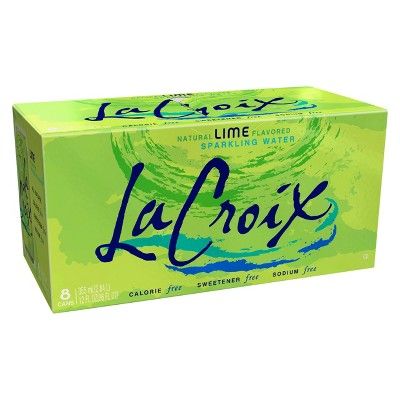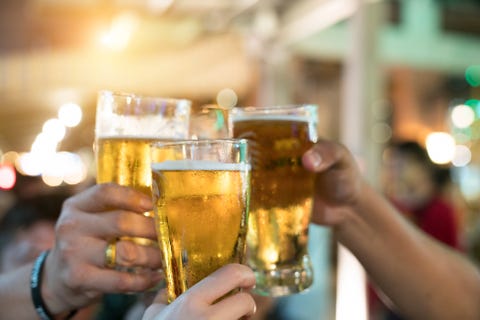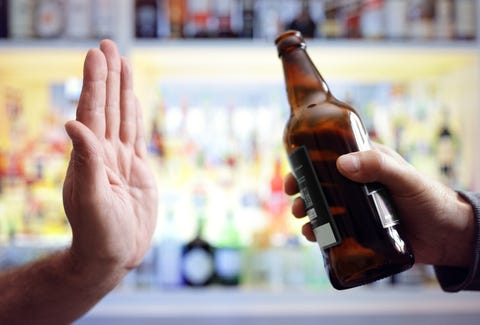What Happens to Your Body When You Don't Drink Booze for a Month
You know—and perhaps even have made—all the usual New Year’s resolutions: eating better, exercising more, saving money, and being nicer.
But giving up alcohol?
With the last 10 years”Dry January” has gained traction as a resolution. The concept is straightforward: Give up booze for the entire first month of the year.

But the supposed benefits derived from doing so are a little more complicated. To vet the health claims of Dry January, we looked at the research and talked to some of the smartest experts in the field.
Read on to find out what downing too much booze does to your body—and whether or not Dry January is really worth it.
First, What Is Dry January?
Created by UK-based nonprofit Alcohol Research UK, the first official “Dry January” began in 2013. That year, more than 4,300 people pledged not to drink any alcohol for the month. And yes, “dry” means abstaining from alcohol for a month—no cheat days.
In 2017, that number spiked to more than 5 million, with the enthusiasm for the campaign spilling into the United States. Dry January participants claim that giving up drinking for one month can reverse the negative health impacts of regular drinking, like fatty liver disease and elevated blood sugar. They also champion that not drinking can improve sleep and enhance energy.
To understand the truth behind these claims, it’s first important to understand how your body processes booze.

Witthaya PrasongsinGetty Images
How Alcohol Affects Your Body
Your body breaks down alcohol via various organs, including your stomach and pancreas, but your liver bears the burden of turning alcohol into less damaging forms.
Through that process, the toxic byproducts from alcohol may lead to inflammation in your pancreas, which could potentially harm your insulin-producing cells and impair your fat metabolism.
While more research is needed to determine the exact mechanisms, repetition of these process may lead to fatty liver, a silent disease that’s relatively benign in its early stages. (Your liver isn’t the only thing at risk: drinking too much can damage your entire body, including your heart, skin, penis, and muscles.)
Even though fatty liver is common in those that drink at or above the guidelines (“moderate” is defined as no more than two drinks per day for men), there is evidence that it’s reversible when you abstain from alcohol or even drink less, says Rotonya Carr, M.D., hepatologist at the Hospital of the University of Pennsylvania.
With continued drinking, about a third of people with fatty liver go on to develop alcoholic hepatitis, or inflammation of the liver, which eventually leads to scarring and the life-threatening condition of cirrhosis in 10 to 20 percent of patients. Even in these advanced stages, research suggests that giving up alcohol can reverse scarring and improve the chance of survival.
“The liver is a very forgiving organ,” adds Dr. Carr, “it can heal itself when the insult, in this case alcohol, goes away.”
So, does Dry January erase all those nights of drinking?
Not quite. It’s going to take more than one month to completely heal your liver and the rest of your body, points out Aaron White, Ph.D., senior scientist at the National Institute of Alcohol Abuse and Alcoholism.
“But taking a month off from drinking is never a bad idea, and is a great time to evaluate your relationship with alcohol,” says White.

BrianAJacksonGetty Images
Dry January Benefits
Anecdotally, people often credit alcohol with helping them sleep. However, a review of studies in 2013 found that alcohol may help people fall asleep quicker and sleep more deeply during the initial stages of sleep, but is likely to disrupt sleep later in the night.
“Alcohol on the whole is not useful for improving a whole night’s sleep. Sleep may be deeper to start with, but then becomes disrupted,” study co-author Chris Idzikowski, Ph.D., and sleep specialist, said in a statement. “Additionally, that deeper sleep will probably promote snoring and poorer breathing. So, one shouldn’t expect better sleep with alcohol.”
Aside from sleep, Dry January can also help you drink less.
It sounds weird, but you may not realize how often or how much alcohol your drink until aren’t drinking it.
While drinking in moderation isn’t all bad — and is, in fact, associated with a reduced risk of heart disease and death — taking one month off may help you drink less throughout 2019. In fact, research suggests it will positively affect your future drinking choices.
In another 2016 study of adults who participated in “Dry January,” researchers found that up to six months later, they were drinking on fewer occasions and drank less when they did imbibe.
If you are a chronic heavy drinker going cold turkey, pay attention for symptoms like insomnia, agitation, sweating, and anxiety. This could signal withdrawal, a potentially life-threatening situation that needs medical supervision. In which case, it’s best to talk to your doc before participating in Dry January first.
You may have a drinking problem if you routinely black out or if friends have expressed concern about how much alcohol you consume. Binge drinking in men typically looks like five or more drinks in the span of about two hours. According to the United States dietary guidelines, men should drink no more than two alcoholic drinks per day. A single drink is roughly a 12-ounce beer, 5-ounce glass of wine, or 1.5-ounce shot of liquor.
Source: Read Full Article


